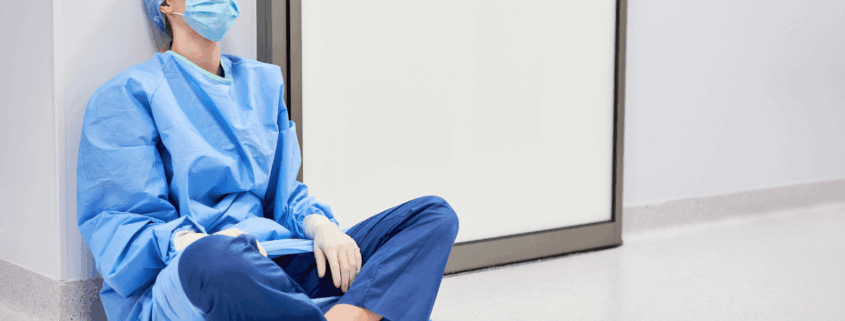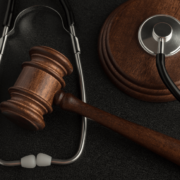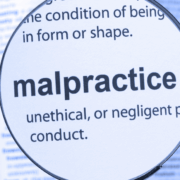Healthcare Provider Burnout and Medical Errors: Establishing Causation
Healthcare provider burnout is an issue affecting both healthcare workers and their patients, and unfortunately, in the years since the pandemic, this issue has only worsened. Burnout happens when providers feel emotionally drained, lose their sense of achievement, and become detached from their work. This condition is often caused by long hours, high-pressure environments, and a lack of support.
Burnout doesn’t just affect the providers; it also impacts the quality of care patients receive. Emotional exhaustion can make it hard for healthcare workers to stay focused and make sound decisions, leading to potential mistakes. Recognizing burnout early is essential for maintaining both the well-being of healthcare providers and the safety of patients.
Unfortunately, burnout often leads to preventable errors. Those errors can lead to irreparable harm to patients. When that happens, patients may be entitled to compensation for medical malpractice. If you’ve been injured by a negligent medical care provider, the team at Bailey, Javins & Carter is here for you. Call us at 800-497-0234 to find out how we can help now.
Connection Between Burnout and Medical Errors
When healthcare providers experience burnout, the risk of medical errors increases dramatically. Burnout can lead to physical and emotional exhaustion, making it harder for doctors and nurses to stay focused and make accurate decisions. Studies have found that stressed and overwhelmed providers are more likely to make mistakes, which can seriously affect patient safety.
For instance, an exhausted nurse might administer the wrong medication, or a tired doctor could misdiagnose a condition. The link between burnout and errors highlights the need for healthcare facilities to address the root causes of burnout. By providing better support and resources for their staff, healthcare organizations can help reduce errors and improve patient outcomes.
Recognizing Signs of Burnout
Burnout in healthcare providers can manifest in a variety of ways, and recognizing these signs is crucial for addressing the issue. One common sign is chronic fatigue. Healthcare workers may feel tired all the time, even after a full night’s sleep. This constant exhaustion can make it hard to stay alert and focused during work hours. One bad shift can leave you in need of a nap—but when you are tired every single morning, regardless of how you slept the night before, burnout may be to blame.
Increased irritability is another warning sign. A healthcare provider who is usually patient and understanding might become easily frustrated or short-tempered. This change in behavior can affect their interactions with both colleagues and patients.
Reduced job performance is also a red flag. Burned-out providers might struggle to complete tasks efficiently or make more mistakes than usual. They may also become less organized, which can impact their ability to provide quality care. Look for providers who have suddenly started showing up late, who need more help or reminders than usual, or who are doing the bare minimum to get through each day.
Feelings of depersonalization are another sign of burnout. Healthcare workers may start to feel disconnected from their work and the patients they serve. They might treat patients as cases rather than people, leading to a lack of empathy and understanding that negatively impacts the care they provide.
Lastly, healthcare providers experiencing burnout might withdraw from social interactions. They may isolate themselves from colleagues, friends, and family. This is often traced back to feeling overwhelmed by their responsibilities. If a care provider who is usually chatty, engaged with others, and communicative suddenly becomes withdrawn and quiet, dig deeper to find out if they need help.
Preventing Burnout to Reduce Errors
Reducing burnout rates among healthcare providers is a critical part of minimizing preventable medical errors. Hospitals and clinics must support their hard-working staff by making sure they have fair work hours and access to mental health resources. Allowing regular breaks and creating a supportive work environment where providers can openly discuss their challenges is also crucial.
Healthcare workers should prioritize self-care whenever possible by engaging in activities they enjoy outside of work and building strong support systems to manage stress. When providers take care of their mental and physical health, they are better equipped to deliver high-quality care to their patients. These efforts help create a safer and more effective healthcare system for everyone involved.
It’s important for healthcare providers to realize that this should not fall completely on their shoulders. Yes, there are things they can do to limit their risk of burnout and protect their mental health; however, they cannot take responsibility for a broken system.
Legal Concerns Related to Medical Malpractice
Medical malpractice happens when a healthcare provider’s negligent mistake or lack of action harms a patient. If a medical error occurs because a doctor or nurse is burned out, it can lead to serious legal issues. Patients who think they have been harmed should be aware of their rights and know when to get legal help.
When a healthcare provider is overworked or stressed, they might not meet the standard of care that patients expect. For example, an exhausted doctor might miss a crucial detail in a treatment plan, or a nurse might give a medication to the wrong patient. These mistakes can cause significant harm, and patients may not even know that they were harmed until they suffer further medical issues as a result.
If you think a medical error has caused you harm, it’s important to act quickly and be cognizant of changes to your health and wellbeing. Maintain detailed records of your symptoms, treatments, and any conversations with your healthcare provider. This information can be very useful if you need to seek legal advice.
Talking to a lawyer who specializes in medical malpractice in Charleston can help you understand your options. They can explain whether you have a valid claim and guide you through the steps needed to take legal action. It’s important to choose a lawyer who is experienced in medical malpractice cases to ensure you get the best advice and support.
It’s important to recognize that medical malpractice is an extremely complex area of law. Patients often believe that any negative outcome or misstep is malpractice, but that is not the case. The truth is that very specific conditions must be met for malpractice to have occurred, and you cannot know if your case fits those parameters until you talk to an attorney.
Take the First Step in Your Claim with Bailey, Javins & Carter
At Bailey, Javins & Carter, we are committed to helping medical malpractice victims seek closure and justice. Call us at 800-497-0234 or reach out online to schedule your consultation.








